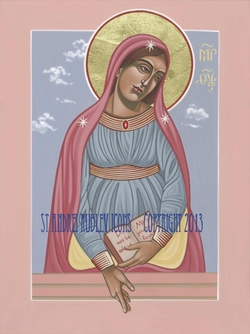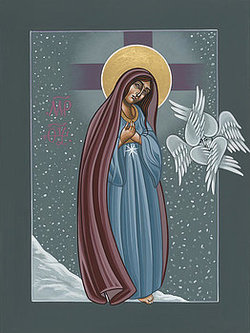 There is a poem I have always liked, and in fact, it is also a favorite Christmas carol. It is called “In the Bleak Midwinter” by Christina Rossetti, a 19th century poet. Why it has come to mind is a mystery to me because it is neither the Christmas season nor is it even winter yet, leave alone midwinter. Bleakness and a Christmas poem are not what I would like to be thinking about as we begin Advent. And yet the first line of the poem came as I began to reflect upon the gospel for this first Sunday in Advent which upon first glance is not joyful sounding in the least. Where are the ‘Advent people’ like Mary and Elizabeth, Zechariah and John the Baptist, or even the angel with His wonderful messages? This gospel is not like that at all, and maybe seems a bit…well… bleak. Perhaps the idea of bleakness has been impactful because we are in a time of year in which the days are shorter, the darkness longer, and events in the news are sounding a bit bleak. There is too much pressure to shop, too much pressure to get everything done for the holidays, (even the spiritual things), all amidst news of a dangerous world. What are we to do? What we are to do is this: stop, take a deep breath, and create just a little bit of quiet in order to reflect on what the Season of Advent is really about: preparation for the coming of Jesus into our world. A place to begin is with the readings for this Sunday with a mind and heart open to the message of God. These readings are actually very hopeful and not bleak at all. The first reading is from the Book of Jeremiah in which God reminded His people that He would fulfill the promise He made to the divided nation, Israel and Judah. He said the Messiah would come and that “Judah shall be safe and Jerusalem shall dwell secure.” (Jer. 33:16) These words were addressed to a suffering nation which had been overtaken by its enemies due to their own complacency. God had never ceased loving them, and upon seeing their repentance, He reminded them that nothing had changed in His relationship to them nor had His love diminished. His promises are always good. Hence, His words were of hope to the people as things looked pretty desolate for them. Let us allow these words to be spoken to us: “You shall be safe and you shall dwell secure.”  In the second reading, from the First Letter to the Thessalonians, St. Paul prayed that the Lord would let their love for one another “increase and abound.” He reminded them that they knew “the instructions we gave you through the Lord Jesus Christ.” (1 Thess 3:12-4:2) The message of Jesus had been given them, so they knew what they were to do in the face of the bleakness of Roman oppression. Lest we forget when this was written, it was during the time when the leaders of the Jewish community were very much against these new Christians, and the Romans were beginning their more active attempts to suppress this “sect.” Therefore this was written in dangerous times which were getting progressively worse. Yet, St. Paul was telling them that they knew how they were supposed to act as taught by Jesus: be generous, make every act an act of love, share what you have with those in need, act with justice, live with hope in the promise that Jesus is with you and that He will return. Let us allow these words to be spoken to us: “You know what to do, and so the Lord will let your love increase and abound.”  Of course, following this is that somewhat 'problematic' Gospel which I referred to earlier. It sounds similar to what we were hearing as the liturgical year ended, and so we might be wondering if someone forgot to turn the page in the Lectionary when we heard it this Sunday. Actually, the themes of early Advent are quite the same as those at the end of the liturgical year: we should be vigilant and prepared, not for horrors, but rather for our Lord to come. Even though in Luke’s gospel Jesus was speaking apocalyptically, saying that “on earth nations shall be in dismay,” He went on to say that what we will see is the Son of Man returning upon a cloud “with power and great glory.” (Luke 21:25-27) These signs will be telling us that the awaited day has come. There is nothing bleak about this at all! It is something wonderful, and we can hope in this because God always fulfills His promises. However, it comes with a final caveat: we need to beware that our hearts “do not become drowsy from carousing and drunkenness and the anxieties of daily life” (Luke 21:34) because when Jesus does return it will be with suddenness. This is a reminder for us not to become complacent like the people in the time of Jeremiah so we are not caught off guard. What Jesus was saying was that we cannot get so caught up in trivialities, power, materialism, and self that we lose track of what really matters, especially the gospel message. If we keep God first in our hearts, doing all we do with His words and His love, and keep the hopefulness of His message in mind, we will persevere, finally joining Him in Heaven where there is no suffering, tears, or pain forever. There is nothing bleak about that message. Indeed, it is very hopeful for those who really hear what Jesus is saying. He will come, He will triumph, and there will be great joy. Let us allow these words to be spoken to us: “Do not become overwhelmed with the anxieties of daily life. There is nothing to fear.”  What we can take away from the readings at the beginning of Advent, then, is a message of mercy and hope. Our world is undeniably a scary place, filled with violence and oppression. But that is not all that it is. Our world has much beauty within it. God is with us and has never left us. His love and mercy for us have never diminished; He cares for us and about us. Therefore the message is one of hope in His protection, faithfulness, love, and ultimate victory over sin and over all who choose to try to destroy the innocent or the faithful ones. And there is nothing dreary or bleak about mercy. God has continually saved us from dangers, especially when we have sinned but then prayed for forgiveness. In this Year of Mercy (which begins next week) we need to consider the message of these Advent Scriptures: that we give what we have received and we let our hearts not be troubled; that we turn from the anxieties of the day toward the mercy and love of God. If we trust in His love and try to become children of mercy, learning to give to others as we have been given, we are indeed prepared for Him to come back in victory. Therefore, instead of thinking of these times as being bleak we need to think of the present as being pregnant. Bleakness points to lifelessness while pregnancy is full of life; bleakness is without much hope, while pregnancy is alive with possibility and hope. In no way am I denying the suffering of this age, or the dangers or threats from those who would do us harm for no reason that makes any sense. But the world is filled with opportunities for love to be born into it. The time is pregnant with needs which can be filled, love which can be shared, lives which can be touched, and hearts that can be healed. The world is pregnant with possibilities for us to be Christ-bearers like Mary, the mother of Jesus: we can pray for others and for reparation of sin, point people to Jesus through our words and deeds; we can live the beatitudes to touch the hearts of the lonely, ill, marginalized, downtrodden, stranger, and those who live lifestyles far from God.  If we do not live the message, there will be little way for others to hear it. God’s word is of hope, not of woe. To paraphrase what Christina Rossetti seems to be saying, the midwinter is not bleak; it is an opportunity for us.* Instead of despairing, thinking we have nothing to give and no way to help, we can give the one thing we do have, the one thing Jesus desires the most, and that which is also our truest means of fighting evil and living in hope: our heart. If we give our heart to Jesus and let Him make a home there, we are indeed ready to stand strong in the face of tribulation, not being overcome by the anxieties of the day. This is what Advent is truly about: standing ready for His coming, becoming pregnant with Him and seeing the world as pregnant with Him, opening the stable of our heart for Him to be born anew. Let us allow these words to be spoken to us: “I am coming!”  May we open wide the doors of our heart so that we may make a space for Jesus to be born there! May we trust in the mercy and love of God! May we be filled with mercy and love, sharing what we have with those who are without! May we be filled with hope, seeing the world as pregnant with opportunities for our love to love increase and abound! And may we enter into Advent with peace, not distracted by the anxieties of daily life, but rather with hope in the promises of God! Let us continue to meet in the Heart of Jesus! Maranatha! Peace! ©Michele L. Catanese * The poem In the bleak midwinter by Christina Rossetti can be found at the following link: http://www.poetryfoundation.org/poem/238450 The top photo is mine: it was taken in the bleak midwinter at Lost Maples State Park, TX. The second photo is also one of mine: it was taken on Copper Mountain in Colorado. I chose it because there is a house on the far right of the photo to represent 'dwelling secure.' Next is an Advent wreath, which of course is to remind us that we are in the new liturgical year, Advent week 1. Next is an icon by Fr. William Hart McNichols called Mother of Holy Hope. It can be found at http://fineartamerica.com/featured/mother-of-holy-hope-263-william-hart-mcnichols.html. Next is another of my photos. This lone bluebonnet was taken in Big Bend National Park, TX. I chose it because it spoke to me of hope since this flower was growing and seeming to flourish in the middle of the desert sand against all odds. The last icon is also by Fr. William Hart McNichols. It is called Nuestra Senora De Las Nieves. It can be found at http://fineartamerica.com/featured/nuestra-senora-de-las-nieves-185-william-hart-mcnichols.html. I chose both icons of Mary for this post because in both she is pregnant. In the first one she is reflecting upon the Word and is filled with hope. In this one she is also reflective and clearly at prayer. The midwinter seems alive with possibility since the presence of God is at hand. Remember, the icons are copyrighted material, used with permission. If you would like to purchase copies of these icons, cards, plaques or any other format of the work of Fr. Bill McNichols, go to his website either through the links above or at http://frbillmcnichols-sacredimages.com/ or http://fineartamerica.com/profiles/william-hart-mcnichols.html?tab=artwork
Carmella Wygant
11/30/2015 09:40:37 am
Beautiful.
David
12/3/2015 05:48:06 am
I really needed to read this message. Sending you a FB message to explain why. Thanks. Comments are closed.
|
Heart Speaks to Heart
|

 RSS Feed
RSS Feed

